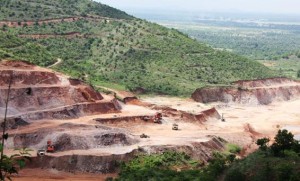1-7 October: Mining, Repression and Imprisonment, an Uncertain Future
October 8, 2012 Burma has been internationally praised for moving in a more democratic direction recently. Sadly for many citizens these changes are a world away. Their interactions with the Burma government are characterized by the same repressive, corrupt, strong armed tactics that made Burma an international pariah for decades.
Burma has been internationally praised for moving in a more democratic direction recently. Sadly for many citizens these changes are a world away. Their interactions with the Burma government are characterized by the same repressive, corrupt, strong armed tactics that made Burma an international pariah for decades.
In the Letpadaung mountains, huge amounts of land have been forcibly confiscated by the government, environmental degradation has occurred and a policy of arrest and detention of peaceful protestors has been implemented. The Monywa Copper Project is located in central Burma’s Sagaing Division with four large deposits: Sabetaung, Sabetaung South, Kyisintaung and Letpadaung. The project covers almost 8,000 acres of land, the majority of which was forcibly taken from villagers.
Resource extraction has been the cause of some of Burma’s largest human rights violations and land confiscations. The Monywa Copper Project is the country’s largest mine in terms of recovery rates, production and revenue. Protests over the project and national attention have been growing, as have the number of arrests and detentions in association with those protests and land confiscation cases.
A Chinese mining company Wan Bao in collaboration with the Burma Army-backed Economic Holdings Ltd. (UMEHL) has confiscated over 7,800 acres of land for the copper mine in the Letpadaung mountain range. Another specific example would be in the town of Wethmay, one of more than two dozen towns affected by the project. This past December authorities tried to force villagers to leave by destroying the village monastery, taking away the religious statues and removing all of the furniture and equipment for the primary school. The villagers organized themselves and protested, so far avoiding the forced relocation and land confiscation that has occurred with increased frequency in this area.
The protest drew national attention; it also resulted in the arrest and detention of 12 peaceful protesters. Nine were released the day and night after the protest, but three were held for four days until a public outcry for their release was headed.
In another instance of unjust arrest and detention Wai Lu, a former political prisoner and land rights activist whose involvement has furthered the prominence of the case, was taken off a bus returning to Rangoon, charged for religious offences and detained for two weeks.
There have also been cases of media restrictions surrounding the project. In March, a private weekly newspaper, The Voice, was sued by the Ministry of Mines after reporting on corruption by the government and the Wan Bao Chinese company involved in the mine.
In addition to the forced relocation, land confiscation, and arrest of peaceful protesters, there is huge environmental degradation occurring in association with the Monywa project. The run off from the mines has irreversibly changed the ecology of surrounding rivers and fields. Villagers are forced to buy bottled drinking water. “While those who cannot afford to have no choice but to drink the contaminated supply. We’re afraid that if this water goes into the Chindwin River it will get worse for the people downstream,” said Han Win Aung of the Political Prisoners Families Network.
Despite the publicized changes that have been occurring in Burma, more and more of these worrying stories are coming out of rural areas. Corrupt government authorities, cronies and the military are taking land from villagers and farmers; those who protest are arrested and imprisoned and media outlets that report on it are sued. All of this is occurring under the cloud of irreversible environmental damage, suggesting an uncertain future for the people of Burma in terms of development, peace and prosperity.
News Highlights
Ethnic MPs say that the rights of ethnic minorities are still not being respected
Inside Burma
The Karen National Union dismisses 3 Karen National Liberation Army leaders after they open liaison office without authorization; appoints Brigadier-General Baw Kyaw Heh as acting commander-in-chief
The Myanmar Peace Support Initiative says it does not plan to return refugees to Burma
Shan Human Rights Foundation reports that forced labor continues in Shan State
Mandalay Capital, Burma’s first investment bank opens
Regional
Burma seeks to cut gas exports to Thailand to meet domestic needs
International
USAID country director wants to start projects in Burma “as quickly as possible”
Norwegian People’s Aid signs an agreement with authorities for clearance of landmines
Burma establishes diplomatic relations with Latvia and Estonia
Opinions
Aung San Suu Kyi Should Stand Up for Justice, Not Politics
By Eva Kusuma Sundari
The Jakarta Globe
I Feel Betrayed by Aung San Suu Kyi
By Nang Seng
The Huffington Post
Latest from the Blog
President Thein Sein’s UN Speech Disguises the Truth Behind Burma’s Reforms
By Burma Partnership
Actions
Statements and Press Releases
Urgent Aid Needed for Rohingya Starving in Their Own Homes
By Burmese Rohingya Organisation UK
Rights Groups Express Strong Concern About Weak Requirements for U.S. Investment in Burma
By EarthRights International, Freedom House, Physicians for Human Rights, US Campaign for Burma and United to End Genocide
Burmese Government and Aid Donors Should Not Seek To Divide Karen
By European Karen Network
Burma: Peaceful Protest Organizers Charged
By Human Rights Watch
International Donors Spurn 60,000 Displaced in Kachin Control Area on China Border
By Kachin Women’s Association – Thailand
Reports
“We Have Seen This Before”: Burma’s Fragile Peace Process
By Burma Partnership
From Persecution to Deprivation: International Donors Neglect 60,000 Displaced Kachin on China-Burma Border
By Kachin Women’s Association – Thailand
This post is in: Weekly Highlights









 All posts
All posts